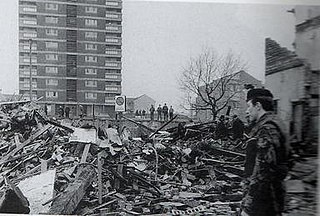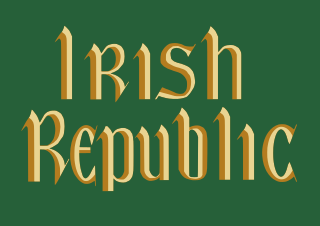Convictions
In November 2001, three men – Noel Maguire, Robert Hulme and his brother Aiden Hulme – were arrested in connection with the bomb attacks in Birmingham and London that year. They were all later convicted at the Old Bailey on 8 April 2003. Robert and Aiden Hulme were each jailed for 20 years. Noel Maguire, who the judge said played "a major part in the bombing conspiracy", was sentenced to 22 years. Two other men, James McCormack, of County Louth, and John Hannan, of Newtownbutler, County Fermanagh, had already admitted the charge at an earlier hearing. McCormack, who played the most serious part of the five, the judge said, was jailed for twenty-two years. John Hannan, who was seventeen at the time of the incidents, was given sixteen years detention. All had links to the Real IRA stronghold of Dundalk in the Republic of Ireland. [3]

The Continuity Irish Republican Army, styling itself as the Irish Republican Army, is an Irish republican paramilitary group that aims to bring about a united Ireland. It claims to be a direct continuation of the original Irish Republican Army and the national army of the Irish Republic that was proclaimed in 1916. It emerged from a split in the Provisional IRA in 1986 but did not become active until the Provisional IRA ceasefire of 1994. It is an illegal organisation in the Republic of Ireland and is designated a terrorist organisation in the United Kingdom, New Zealand and the United States. It has links with the political party Republican Sinn Féin (RSF).
The Real Irish Republican Army, or Real IRA (RIRA), is a dissident Irish republican paramilitary group that aims to bring about a United Ireland. It formed in 1997 following a split in the Provisional IRA by dissident members, who rejected the IRA's ceasefire that year. Like the Provisional IRA before it, the Real IRA sees itself as the only rightful successor to the original Irish Republican Army and styles itself as simply "the Irish Republican Army" in English or Óglaigh na hÉireann in Irish. It is an illegal organisation in the Republic of Ireland and designated as a proscribed terrorist organisation in the United Kingdom and the United States.

The Omagh bombing was a car bombing on 15 August 1998 in the town of Omagh in County Tyrone, Northern Ireland. It was carried out by the Real Irish Republican Army, a Provisional Irish Republican Army (IRA) splinter group who opposed the IRA's ceasefire and the Good Friday Agreement, signed earlier in the year. The bombing killed 29 people and injured about 220 others, making it the deadliest single incident of the Troubles in Northern Ireland. Telephoned warnings which did not specify the actual location had been sent almost forty minutes beforehand but police inadvertently moved people toward the bomb.
The Guildford pub bombings occurred on 5 October 1974 when the Provisional Irish Republican Army (IRA) detonated two 6-pound (2.7-kilogram) gelignite bombs at two pubs in Guildford, Surrey, England. The pubs were targeted because they were popular with British Army personnel stationed at Pirbright barracks. Four soldiers and one civilian were killed. Sixty-five people were wounded.

On 4 December 1971, the Ulster Volunteer Force (UVF), an Ulster loyalist paramilitary group, detonated a bomb at McGurk's Bar in Belfast, Northern Ireland. The pub was frequented by Irish Catholics/nationalists. The explosion caused the building to collapse, killing fifteen Catholic civilians—including two children—and wounding seventeen more. It was the deadliest attack in Belfast during the Troubles.

The 2001 Ealing bombing was a terrorist attack on in Ealing Broadway, West London, England by the Real Irish Republican Army (RIRA), a splinter group of the Provisional Irish Republican Army (PIRA), that participated in the Troubles in Northern Ireland.
The 2001 BBC bombing was a terrorist attack on the BBC's main news centre within BBC Television Centre, on Wood Lane in the White City area of West London.

The Harrods bombing refers to the car bomb that exploded outside Harrods department store in central London, England, on Saturday 17 December 1983. Members of the Provisional Irish Republican Army planted the time bomb and sent a warning 37 minutes before it exploded, but the area was not evacuated. The blast killed three police officers and three civilians, injured 90 people, and caused much damage. The IRA Army Council said it had not authorised the attack and expressed regret for the civilian casualties. After the bombing, the IRA shifted its emphasis towards attacks on military targets on the mainland.
This is a timeline of actions by the Real Irish Republican Army, also called the Real IRA, an Irish republican paramilitary group. The group was formed in late 1997 by members of the Provisional Irish Republican Army who disagreed with that organisation's ceasefire. Since June 2012, following a merger between Republican Action Against Drugs, the Real IRA and smaller republican militant groups, the new organisation has commonly been referred to as the New IRA.
The 2010Newry car bombing occurred on the night of 22 February 2010. It exploded outside a courthouse in Newry, County Down, Northern Ireland, damaging the building and others in the area. There were no fatalities or injuries.

The dissident Irish republican campaign began at the end of the Troubles, a 30-year political conflict in Northern Ireland. Since the Provisional Irish Republican Army called a ceasefire and ended its campaign in 1997, breakaway groups opposed to the ceasefire and to the peace agreements have continued a low-level armed campaign against the security forces in Northern Ireland. The main paramilitaries involved are the Real IRA, Continuity IRA and formerly Óglaigh na hÉireann. They have targeted the Police Service of Northern Ireland (PSNI) and the British Army in gun and bomb attacks as well as with mortars and rockets. They have also carried out bombings that are meant to cause disruption. However, their campaign has not been as intensive as the Provisional IRA's, and political support for groups such as the Real IRA is "tending towards zero".
On Wednesday 20 September 2000, the Real Irish Republican Army (RIRA) carried out an attack on MI6's SIS Building headquarters in Vauxhall, Lambeth, London. A Russian-built RPG-22 anti-tank rocket, fired 300 metres away from MI6 headquarters, struck the building on the south side of the eighth floor, causing superficial damage. No fatalities or injuries were recorded.
On 17 June 1974 the Provisional IRA bombed the British Houses of Parliament causing extensive damage and injuring eleven people.
This is a timeline of the events and actions during the Troubles that were carried out in mainland Britain, the vast majority of which were carried out by Irish Republican paramilitaries mainly the Provisional IRA were by far the most active but both the Official IRA and the Irish National Liberation Army, also carried out a number of attacks, which included bombings and shootings. Ulster Loyalist paramilitary groups also carried out a small number of violent actions.
The 1998 Banbridge bombing was the explosion of a car bomb in the town of Banbridge in County Down, Northern Ireland on 1 August 1998. Thirty-three civilians and two Royal Ulster Constabulary (RUC) officers were injured in the attack in a busy shopping street that was later claimed by the Real Irish Republican Army (RIRA), a dissident Irish republican group.
The Slovak Three were Irishmen Michael Christopher McDonald, Declan John Rafferty and Fintan Paul O'Farrell, who were members of the Real IRA. They were arrested in a sting operation in Slovakia conducted by British security agency MI5 in 2001 after they were caught attempting to buy arms for their campaign. They believed they were purchasing weapons from Iraqi intelligence agents and that Saddam Hussein was to play a role in the Real IRA similar to the one Colonel Gadaffi had in its predecessors the Provisional IRA. The three men met in Piešťany, a spa town in Western Slovakia, after months of meetings and telephone calls—all of which were intercepted and overheard by MI6. Believing its case to be now fireproof, MI5 had passed details of the men and their intentions to the Slovak authorities, who ambushed the men on the evening of 5 July 2001 after their meeting. They were arrested and imprisoned in the expectation Slovakia would receive a formal extradition request from the UK.

The The New Irish Republican Army, or New IRA (NIRA), is a paramilitary organisation founded in July 2012. It was formed after the Real Irish Republican Army (RIRA), Republican Action Against Drugs (RAAD) and other small Irish republican paramilitary groups merged.







